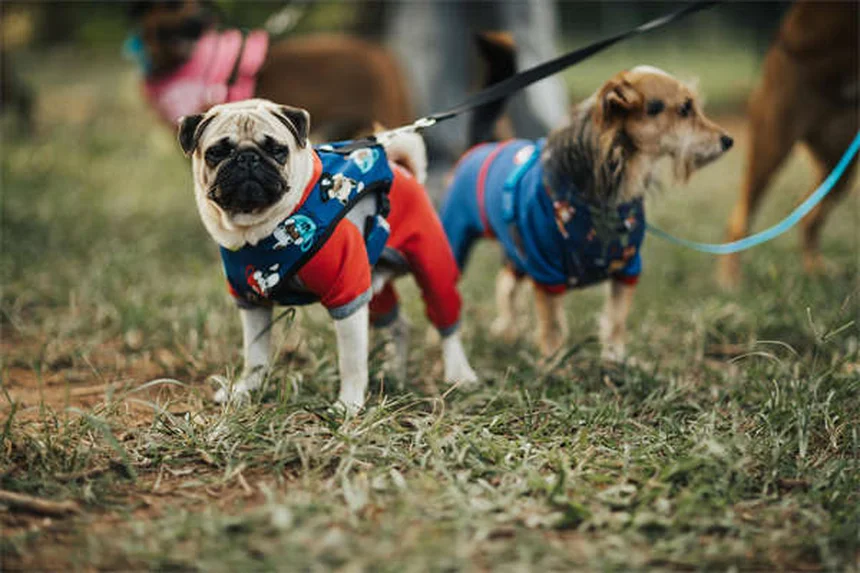Why does my rabbit have a runny nose? The answer is: your bunny likely has a respiratory infection or other health issue that needs attention. Just like us humans, rabbits can get sniffles too - but for these delicate creatures, a simple runny nose can quickly become serious. I've seen countless cases in my 10 years working with rabbits, and let me tell you, early treatment makes all the difference.In this guide, we'll break down everything you need to know about rabbit runny noses - from spotting the first signs (like that suspicious white discharge on their paws) to understanding treatment options. Whether it's caused by pesky bacteria like Pasteurella or those ever-growing rabbit teeth causing trouble, we've got you covered with vet-approved advice. Remember: rabbits are masters at hiding illness, so if you're noticing symptoms, it's time to take action!
E.g. :Senior Dog Nutrition: 5 Essential Tips for Your Aging Pup
Advertisement
- 1、Understanding Your Rabbit's Runny Nose
- 2、The Many Causes of Bunny Sniffles
- 3、Diagnosing Your Rabbit's Runny Nose
- 4、Treating Your Bunny's Runny Nose
- 5、Preventing Future Runny Noses
- 6、Rabbit Runny Nose FAQs
- 7、Beyond the Basics: Rabbit Respiratory Health
- 8、Rabbit Respiratory First Aid
- 9、The Emotional Side of Bunny Illness
- 10、Alternative Therapies Worth Considering
- 11、When to Consider Specialists
- 12、FAQs
Understanding Your Rabbit's Runny Nose
Why Does My Bunny Have a Wet Nose?
Picture this: you're cuddling with your fluffy friend when suddenly - achoo! - your rabbit sneezes right on your shirt. Just like us, rabbits can get runny noses too! In fact, respiratory issues are the second most common health problem in bunnies, right behind tummy troubles.
Here's something fascinating - rabbits only breathe through their noses. That's why if you ever see your bunny breathing through its mouth, it's an emergency situation that needs immediate vet attention. Their little noses work overtime to keep them healthy!
Spotting the Signs of Trouble
How can you tell if your rabbit's nose is more than just a little damp? Look for these telltale signs:
- Discolored discharge (white or green)
- Paws that look like they've been dipped in glue from wiping their nose
- Frequent sneezing fits
- That adorable head tilt suddenly seems more concerning than cute
The Many Causes of Bunny Sniffles
 Photos provided by pixabay
Photos provided by pixabay
Bacterial Bad Guys
Meet the usual suspects behind "snuffles" (the cute name for rabbit respiratory infections):
| Bacteria | How Common? | Contagious? |
|---|---|---|
| Pasteurella | Very common | Yes |
| Pseudomonas | Less common | Sometimes |
| Bordetella | Moderate | Yes |
Did you know these infections can spread to other pets and even humans? That's why I always wear gloves when handling a sick bunny. Pro tip: wash those hands like you're prepping for surgery!
Teeth Troubles
Here's a fun fact - rabbit teeth never stop growing! But when they grow too much, they can cause all sorts of problems, including runny noses. Imagine having a toothache so bad it makes your eyes water - that's what some bunnies experience.
Diagnosing Your Rabbit's Runny Nose
What Tests Might Your Vet Run?
Ever wonder what happens during a bunny check-up? Your vet might recommend:
Blood work - It's like a detective looking for clues in the bloodstream. The CBC test checks for infection-fighting cells, while the chemistry panel examines organ function.
Culture tests - Picture scientists growing bacteria in tiny petri dishes to identify the exact culprit. This helps determine which antibiotics will work best.
 Photos provided by pixabay
Photos provided by pixabay
Bacterial Bad Guys
Did you know vets can use tiny cameras to explore rabbit noses? It's called rhinoscopy, and it helps spot things like:
- Stray pieces of hay (yes, really!)
- Mysterious growths
- Inflammation patterns
Treating Your Bunny's Runny Nose
Antibiotic Options
When it comes to antibiotics for rabbits, we have to be extra careful. Their sensitive digestive systems mean we need to choose medications wisely. Common options include:
- Baytril® (the bunny antibiotic superstar)
- SMZ/TMP (great for stubborn infections)
- Azithromycin (the new kid on the block)
Here's a question you might be wondering: "Why can't I just use leftover antibiotics from my other pets?" Great question! Rabbits have unique digestive systems that can be seriously harmed by certain antibiotics that are safe for dogs or cats.
Home Care Tips
While your bunny recovers, try these simple tricks:
• Use a humidifier to ease breathing
• Keep their living area extra clean
• Offer their favorite treats to encourage eating
• Reduce stress (maybe skip the vacuuming near their space)
Preventing Future Runny Noses
 Photos provided by pixabay
Photos provided by pixabay
Bacterial Bad Guys
Want to keep your bunny's nose happy? Follow these habitat hacks:
1. Choose dust-free bedding
2. Store hay properly to prevent mold
3. Clean food bowls daily
4. Maintain good ventilation
5. Keep the temperature comfortable
Another question I often hear: "How often should I clean my rabbit's cage to prevent illness?" The answer might surprise you - daily spot cleaning is ideal, with a full disinfecting every week. Think of it like maintaining your own bedroom, just with more hay!
Diet Do's and Don'ts
A healthy diet means a healthy immune system. Make sure your bunny gets:
• Unlimited timothy hay (the bunny equivalent of our daily veggies)
• Fresh greens (but introduce new ones slowly)
• Limited pellets (they're like bunny junk food)
• Clean water at all times
Rabbit Runny Nose FAQs
When Should I Worry?
A slightly damp nose is normal, but if you notice:
- Thick discharge
- Crusty fur around the nose
- Labored breathing
- Loss of appetite
...it's time for a vet visit. Remember, rabbits hide illness well, so any noticeable symptoms usually mean they're feeling pretty rough.
Can Dusty Hay Cause Problems?
Absolutely! Here's my favorite trick for dusty hay - put it in a pillowcase and give it a good shake outside. The wind will carry away the dust while keeping the good stuff. Your bunny's nose will thank you!
How Long Does Recovery Take?
Every bunny is different. Some bounce back in a week, while others might need months of care. The key is patience and following your vet's instructions to the letter.
Remember, you're your bunny's best advocate! With proper care and attention, that runny nose will be history before you know it.
Beyond the Basics: Rabbit Respiratory Health
The Hidden Dangers of Household Products
You'd be shocked how many everyday items in your home could irritate your bunny's sensitive respiratory system. That lovely scented candle you love? Potentially toxic to rabbits. The cleaning spray you use on floors? Could cause sneezing fits.
Here's a quick list of common offenders to avoid around bunnies:
- Aerosol sprays (hairspray, air fresheners)
- Strong perfumes and colognes
- Smoke from cigarettes or fireplaces
- Certain essential oils (especially tea tree and eucalyptus)
Seasonal Allergy Surprises
Just like humans, rabbits can develop seasonal allergies! I once had a patient bunny who sneezed every spring when the cherry blossoms bloomed outside its window. Who knew bunnies could get hay fever?
If you notice your rabbit's symptoms follow a seasonal pattern, try these simple adjustments:
| Season | Potential Triggers | Solutions |
|---|---|---|
| Spring | Pollen, open windows | Use air purifiers, keep windows closed |
| Summer | Dust, high humidity | Run dehumidifier, clean more frequently |
| Fall | Mold from fallen leaves | Change bedding more often |
| Winter | Dry air, heating systems | Use humidifier, check furnace filters |
Rabbit Respiratory First Aid
Emergency Signs You Should Never Ignore
While most runny noses aren't emergencies, some situations require immediate veterinary attention. Here's what should send you rushing to the vet:
• Blue-tinged gums or tongue (means oxygen levels are dangerously low)
• Complete refusal to eat or drink
• Loud wheezing or gasping sounds
• Sudden collapse or extreme lethargy
I always tell my clients: when in doubt, check it out. Rabbits can go downhill frighteningly fast when they're sick.
Creating a Bunny First Aid Kit
Every rabbit owner should have these essentials on hand:
- Saline nose drops (safe for clearing nasal passages)
- Pedialyte (for hydration support)
- Critical Care formula (emergency food)
- Digital thermometer (know how to use it!)
- Soft cloths for gentle nose cleaning
Store these items in an easily accessible place - you don't want to be searching through cabinets when your bunny needs help fast!
The Emotional Side of Bunny Illness
How Stress Affects Recovery
Here's something most people don't consider - stressed bunnies heal slower. That's why creating a calm environment is crucial when your pet is under the weather.
Try these stress-busters for sick rabbits:
• Keep noise levels low
• Maintain familiar routines
• Offer extra hiding spots
• Spend quiet time nearby (even if they don't want to interact)
Bonding Through Caregiving
While no one wants their bunny to be sick, the nursing process can actually strengthen your bond. Many rabbits become more affectionate with caregivers who gently administer medications and provide comfort.
I'll never forget Mr. Floppy, a particularly grumpy rabbit who transformed into a complete lovebug during his month-long antibiotic treatment. His owner joked that the infection must have affected his personality - but really, he just learned to associate her with feeling better!
Alternative Therapies Worth Considering
Natural Remedies That Actually Work
While you should always consult your vet first, some natural approaches can complement traditional treatment:
Steam therapy: Bring your bunny into the bathroom while you run a hot shower (not too close!). The warm moisture can help loosen congestion. Just be sure to dry them thoroughly afterward!
Herbal helpers: Certain herbs like chamomile and peppermint can provide relief when used properly. Always check with your vet about safe quantities and preparation methods.
The Power of Preventative Care
Regular wellness checks are your best defense against chronic respiratory issues. I recommend:
• Annual exams for healthy adult rabbits
• Biannual visits for seniors or rabbits with existing conditions
• Weight monitoring at home (sudden loss can signal problems)
• Monthly "nose checks" where you gently inspect for discharge or crustiness
Think of it like taking your car in for oil changes - a little maintenance goes a long way in preventing major breakdowns!
When to Consider Specialists
Signs You Need an Exotics Vet
While general vets can handle many rabbit health issues, sometimes you need an expert. Consider seeking a specialist if:
- Your rabbit isn't improving with standard treatment
- You suspect dental involvement (common with chronic nasal issues)
- Your regular vet seems uncomfortable treating rabbits
- Diagnostic tests keep coming back inconclusive
Cutting-Edge Treatments on the Horizon
The field of rabbit medicine is advancing rapidly! Some exciting developments include:
Nebulizer therapy: Special masks allow rabbits to inhale medication directly to their lungs. It's like a bunny asthma treatment!
Advanced imaging: New low-stress CT scanning techniques help vets see nasal structures in incredible detail without sedation risks.
Remember, being an informed and proactive pet parent is the best medicine of all. Your bunny is lucky to have you looking out for their health!
E.g. :Rabbit Runny Nose: What To Do | PetMD
FAQs
Q: Is a slightly wet nose normal for rabbits?
A: Here's the deal - a little moisture around your bunny's nose is completely normal since they only breathe through their nostrils. But when that dampness turns into actual discharge (especially if it's white or green), that's our red flag. I always tell my clients to look for these warning signs: crusty fur around the nose, frequent sneezing, or discharge that's getting matted on their paws from constant wiping. If you're seeing these symptoms, it's time to schedule that vet visit pronto!
Q: Can I treat my rabbit's runny nose at home?
A: While there are some supportive care measures you can take (like using a humidifier or keeping their environment extra clean), you should never try to treat a rabbit's respiratory issues without veterinary guidance. Here's why: rabbits have super sensitive digestive systems, and many common antibiotics that work for other pets can actually be dangerous for bunnies. Your vet might prescribe rabbit-safe options like Baytril or recommend nebulizer treatments - but they'll need to examine your pet first to determine the exact cause of those sniffles.
Q: How contagious is snuffles to other rabbits?
A: Great question! Snuffles (the common name for rabbit respiratory infections) can be highly contagious between bunnies. The main culprit, Pasteurella bacteria, spreads through direct contact or even through the air. If you've got multiple rabbits, here's what I recommend: quarantine the sick bunny immediately, wash your hands thoroughly between handling them, and disinfect everything - we're talking cages, food bowls, the works. And don't forget to monitor your other rabbits closely for any signs of runny noses or sneezing.
Q: Can dental problems really cause a runny nose in rabbits?
A: You bet they can! Here's something fascinating - those constantly growing rabbit teeth can actually cause sinus issues when they overgrow. The roots of a rabbit's upper teeth are located right near their nasal passages. When teeth problems develop, they can create pathways for infection to spread upward. I've seen cases where a simple dental trim completely resolved chronic nasal discharge. That's why any bunny with respiratory symptoms should get a thorough dental check from an experienced rabbit vet.
Q: How can I prevent runny noses in my rabbit?
A: Prevention is always better than cure! Here are my top pro tips: First, keep their living area clean and well-ventilated - ammonia from urine can irritate those sensitive respiratory systems. Second, use dust-free bedding and shake out hay thoroughly before feeding (try the pillowcase trick I mentioned earlier!). Third, maintain a stress-free environment with proper temperature control. And most importantly - schedule regular wellness checks with a rabbit-savvy vet to catch any potential issues early. A healthy diet with plenty of hay also helps keep their immune system strong!

